How Yelp Scams Photographers (and Other Business Owners)
![]()
If you’re a local business owner, you know that your number-one priority, day-in and day-out, is marketing your services and finding new customers. And in this digital age, the available options for marketing are surprisingly limited.
Because of the winner-take-all nature of social media technology, you’re basically stuck with Google, Facebook/Instagram, Thumbtack, or Yelp. (There are a handful of other small platforms that are relevant to specific service industries.) No wonder a recent report by Reuters showed that 60% of all online advertising spending occurs on just Google and Facebook.
Although we may disagree with their policies, hate the constant harassment by their salespeople, and generally mistrust these platforms, local business owners simply have no choice but to buy advertising through them in order to make sure consumers are aware of our services.
One of them, however, should be avoided at all costs.
In this article, I’m going to cover the rampant abuse and dishonesty Yelp uses to defraud photographers and other small business owners who are using their advertising platform. I learned about these issues while advertising for my corporate headshots studio in San Francisco, and wanted to share what I found so that others don’t fall into the same traps.
Some of those reading may have seen the movie Billion Dollar Bully, a popular Netflix documentary covering Yelp’s sales and customer service tactics. The film covers the experiences of several small business owners who’ve been lied to or fell victim to Yelp’s temperamental “review filtering” algorithm.
While Yelp’s sales tactics are generally despicable, but perhaps not illegal, what I’m about to show you in this article amounts to direct fraud. I have no intention of wasting a year of my life fighting them in court, so I’d rather just show you the evidence, warn the business community, and hopefully save you a couple bucks.
But before I get into Yelp’s fraudulent actions, let’s first cover how their advertising actually works.
The Yelp Advertising Model
Yelp is a search-based PPC (pay per click) advertising platform, which means that advertisers (aka small business owners) pay whenever someone “clicks” on their advertisements. You are never charged if someone doesn’t click on your ad.
Typically, PPC advertising is more expensive than other types of advertising for two reasons:
- Advertisers only pay for “clicks,” so business owners are theoretically only paying to attract potential customers interested in their services. (You are paying for performance vs. paying to show your ad.)
- The advertising platform should theoretically only show your ads to people who have “searched” for keywords that are relevant to your business. For example, if you run a restaurant, your ads shouldn’t show up for people who are searching for a local plumber, florist, personal trainer, etc.
According to their website, Yelp helps you “Drive traffic to your Yelp Business Page with Yelp Ads. Yelp Ads appear in a variety of places, including on relevant search result pages and competitor business pages on Yelp.”
As Yelp claims to be used by 178 million unique visitors per month, they are an understandably enticing platform for photographers to advertise on.
A Platform Designed to Deceive Business Owners
But there’s a big problem with Yelp’s advertising system. Specifically, the platform is designed to deceive photographers by obscuring the source of the visitors (aka “clicks”) to your Yelp page.
Business owners believe that they’re paying to have their ads show on relevant search results for their business, but they’re actually being shown on completely irrelevant and potentially horrifying results pages.
If you’re a wedding photographer who uses Yelp ads, it’s very likely your ads are showing on searches for: “cheap family portraits”.
If you’re a family portrait photographer, you likely have your ads showing for “cheap headshots near me” and “pre-wedding photography.”
To be clear, these ads are being shown, they are getting clicked on, and you are left paying the bill ($5-$15 per click) — even though the visitor never had any intention of using a service like yours, and that was transparently obvious from their search term.
How Yelp Uses a Keyword Bait-and-Switch
In the PPC advertising world, every search keyword has its own price—clicks from some keywords are worth more, while other clicks are worth less.
Typically, the price of any given keyword is based on two factors:
- Total price of the service – For more expensive services, advertisers are willing to pay more for potential customers. For instance, the term “personal injury lawyer” on Google can cost anywhere from $50 to $100 per click. But that’s potentially worth it given the profit involved. If someone is searching for “cheap pizza near me”, there’s no way anyone is bidding even $20+ for a click from that keyword.
- Competition – If a product/service has lots of competition, the various vendors will compete for their ad to be placed near the top for that search query. Just like any other auction, the more competition, the higher the price.
For many photographers and other small business owners, Yelp is an enticing platform for advertising. While the clicks are expensive, they promise to deliver exposure to a local audience of people who are looking for services just like yours.
But what they promise isn’t remotely like what they deliver.
How Yelp Says Their Ad Platform Works
So, how does Yelp advertising actually work? To show you, here is a screenshot of the Yelp advertising portal where you select your keywords for targeting your PPC ads. According to Yelp, simply select your keywords, then pick the text that’d you’d like to be inside your ad, and you’re off to the races!
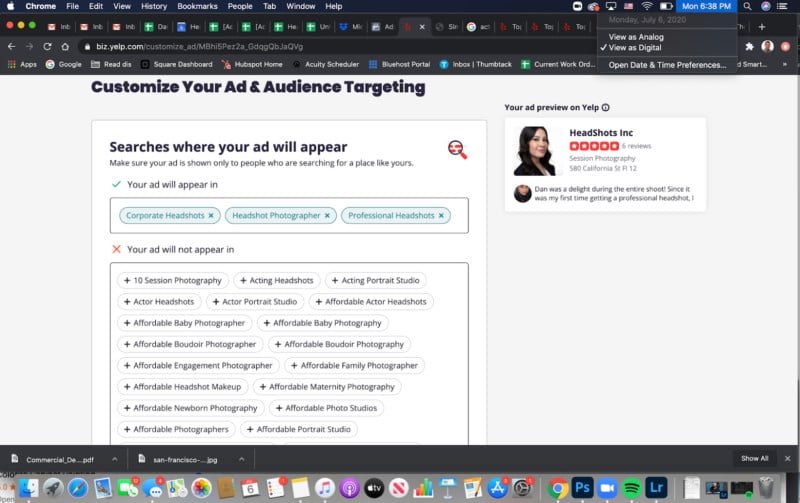
Clearly, in this platform, I have selected that I’d like to advertise for the keywords “headshot photographer” “corporate headshots” and “professional headshots” — because these are the only kinds of keywords that are relevant for my studio. So, theoretically, my ads will show up when someone in San Francisco (where my studio is located) searches for the above types of services.
In fact, because headshots are an expensive service, I’m even willing to pay between $8 and $15 for each one of those clicks. (As long as I’m getting exposure to a real human who is interested in what I provide.)
On the same screen, I’ve indicated that I’d like NOT to advertise for “acting headshots”, “affordable photographer”, “affordable engagement photographer”, and a litany of other keywords that are within the general field of photography, but completely irrelevant to my business.
Now, if someone in San Francisco searches for the keyword “cheap wedding photography” on Yelp — would you reasonably think that my Yelp ad would not be shown? You would reasonably think that my ads would only show up for keyword searches related to “headshot photographer”, “professional headshots” and “corporate headshots”.
Well, I’m sure this doesn’t surprise you at this point, but you’d be dead wrong.
How Yelp’s Advertising ACTUALLY Works
As it turns out, Yelp’s keyword targeting is intentionally broken so that they can maximize their ad revenue.
Over the course of several months advertising with them ($10k in total ad spend), Yelp claimed to be driving a TON of traffic to my page, but curiously, none of that traffic was actually clicking into my website to book or contact me.
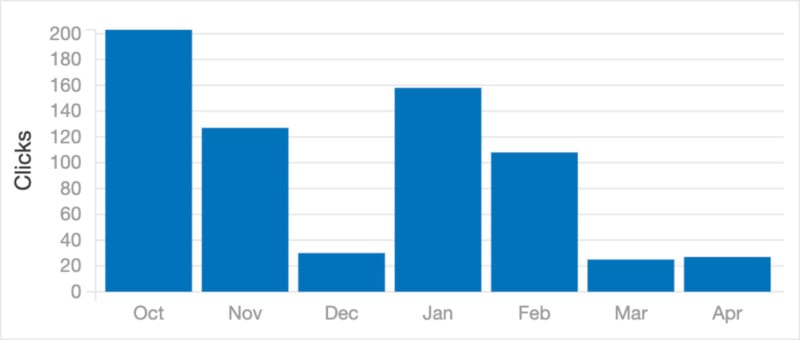
That’s weird, because before I started advertising, one out of four visitors who came to my page ended up clicking on my website. But now, almost 0% of the advertising traffic took any interest in my services beyond the initial click. They didn’t even click from my Yelp profile to my website.
Theoretically, Yelp should be driving traffic to my page among people who are searching for headshot photographers. So what’s the deal?
Did people hate my photos?
Maybe I was too expensive…or too cheap?
Maybe people didn’t like my written Yelp introductory section?
I drove myself crazy trying to figure out why people who were searching for headshots weren’t contacting me. (My Google and Facebook ads worked exceptionally well.) Maybe Yelp just caters to a different crowd than on the other channels?
And then, I found out what actually happened.
Yelp Included My Ads for Terrible Keyword Searches (and they’re doing it to you, too)
Apparently, the list of keywords in their “ad targeting” platform is not a complete list. They have hundreds, if not thousands, of other keywords that are searched by Yelp customers who are generally looking for businesses in the category “Session Photography.”
As a photographer, your ads are automatically enrolled in those search queries, regardless of whether the search is relevant to your business. You cannot deselect or opt out of them.
Here are some examples of the absurd places my ads were showing when I was targeting the keywords “headshot photographer”, “corporate headshots” and “professional headshots”.
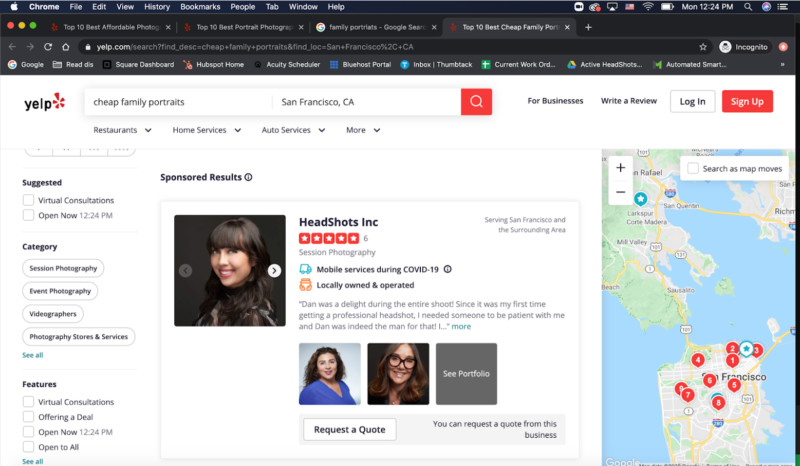
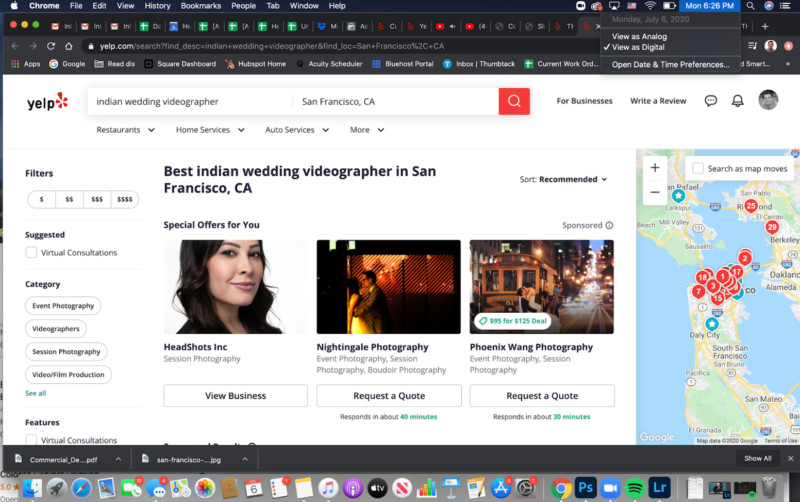
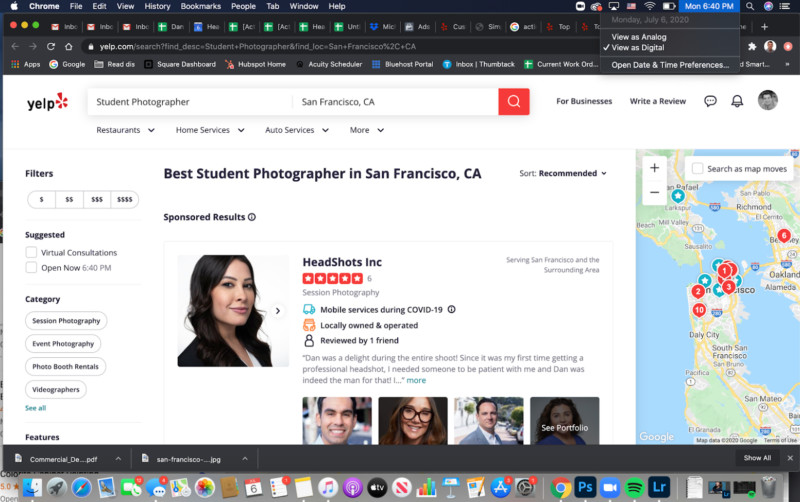
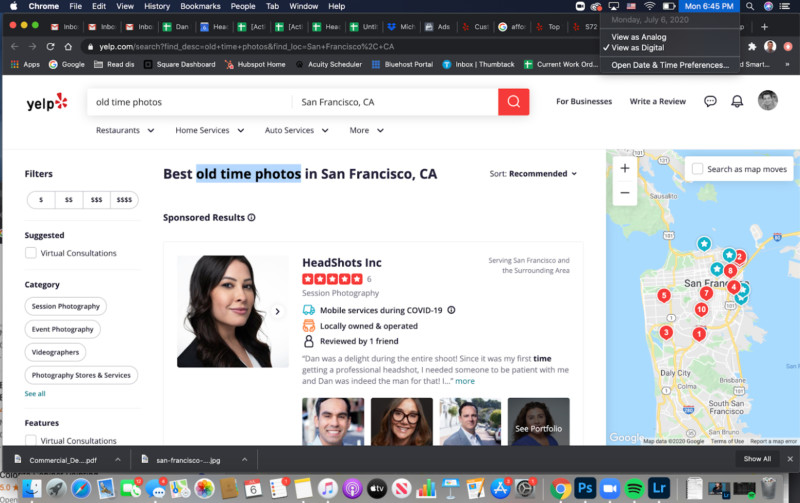
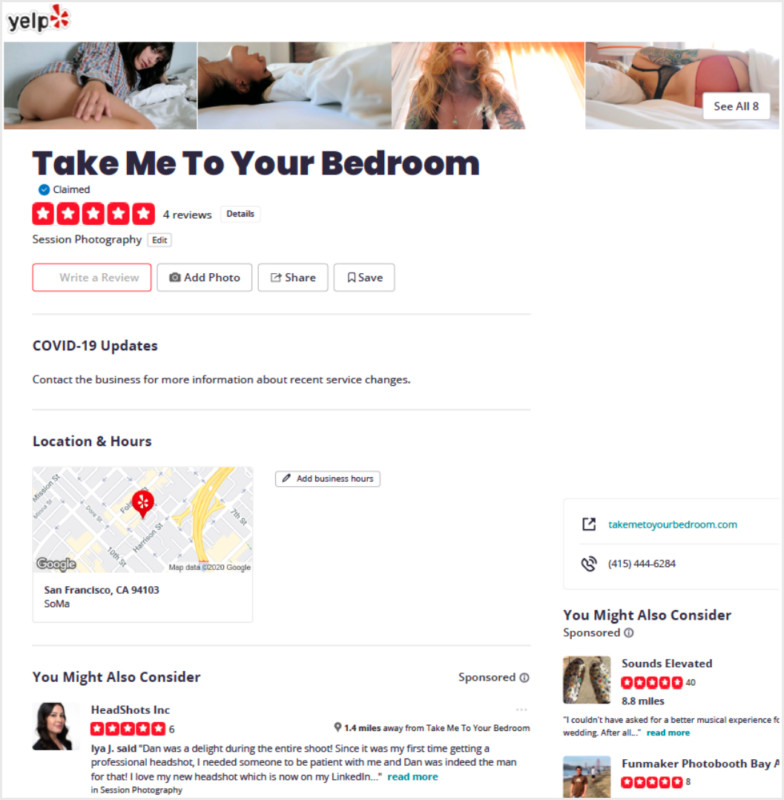
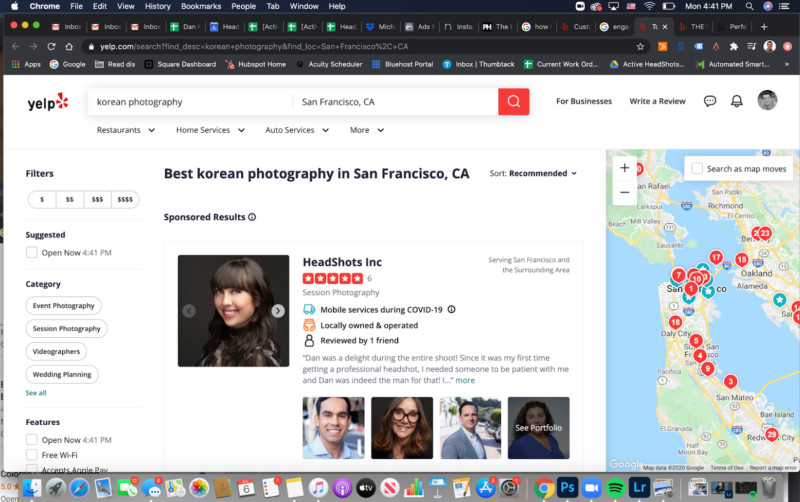
This is a “feature” they NEVER explain or describe ANYWHERE on their website. In fact, here is a screenshot of their description of their ad targeting:
![]()
Because photographers are lumped together into the business category “Session Photography”, our ads are all mixed up. We’re automatically opted-in to ads on completely irrelevant searches. Sure, some people who see our irrelevant advertisements will still click on them (and Yelp will charge us), but they have zero intent to purchase services or contact us.
So, photographers around the world are being charged $5 to $15 for clicks, for completely irrelevant search keywords, and there’s no way to fix it inside Yelp.
To see if this is happening to you, go to Yelp and search “[irrelevant service] + [city name]”, and see if your ads show up. If you’re an advertiser, clicks from these irrelevant search queries could actually be the majority of the traffic going to your page. (No wonder Yelp ads don’t work.)
The only way to opt-out of these ads is to manually add every single potential search query into a big negative keyword list. That’s impossible. And even if it were possible, that button is located at the very bottom of the ad targeting platform… in size 8 font.
During my time advertising, I found that my ads almost never showed up for “professional headshots” or “corporate headshots”, but almost exclusively displayed for irrelevant search terms, which is why almost none of these people wanted to click toward my website.
Let’s say you’re crazy and you want to try to manually block all the keywords that aren’t relevant to your business.
Does Yelp have a complete list of keywords you can reference and block? Nope.
Do they offer to help you block your ads from showing in irrelevant searches? Nope.
Does the system account for minor variations on keywords like a Yelp user adding an “s” at the end of the keyword you blocked? Nope.
So, you have to manually type out hundreds of keywords that you come up with (and you can never come up with all of them), letter-for-letter, into the negative box on the ad platform. You can see my working section below:
![]()
Even then, if a Yelp user searches with a typo, or a minor variation of that keyword you blocked — your ad will still show up. If you block “cheap student photographer”, you may still show up for “affordable student photographer”, “cheap student photography”, etc.
Broken Analytics Help Disguise the Fraud
So if photographers across the globe are being scammed by Yelp into paying for clicks that create zero new inquiries and clients, how come nobody has noticed before?
It’s because Yelp has a nearly useless analytics dashboard, which specifically doesn’t tell you where your clicks came from. You have no idea whether a click came from someone who was searching for “headshots” or someone who was searching for “Korean Photography”.
If you complain to your Yelp representative about a lack of new business from advertising, they will lecture you about “increasing your advertising spend” so that you can “get more reviews”.
Is This Issue Only Affecting Photographers?
Not at all. But we are uniquely affected, because the “Session Photography” category is so broad. Your boudoir photography ads are showing up for people searching for “wedding photos”. Your portrait ads are showing up for people looking for a “cheap engagement photographer”.
It is very likely that similar problems plague business owners in other categories.
Yelp’s Terms of Service Executed in Bad Faith
On top of all of this behaviour, Yelp hides behind draconian terms of service that include two important provisions.
- By advertising, you are automatically agreeing to waive your right to a traditional legal process in the case of disputes. You have to use the “mutually binding arbitration” process that they mention in their TOS.
- By advertising, you are waiving your right to participate in or lead a class action lawsuit against Yelp.
Here is a link to Yelp’s Terms of Service.
Now, to be fair, some of these terms are fairly standard among large corporations. However, a reasonable person might think that since Yelp is including a provision in their terms of service that explicitly outlines a process for arbitrating disputes, you might also assume that they provide a clear process for requesting that arbitration.
If you thought this, you would, of course, be wrong.
Over the course of two months, I had to constantly follow up with Yelp customer service representatives and use their “legal portal” (which is just a form on their website) in order to request arbitration. I wanted a refund on my $10k ad spend.
I then decided to skip the process and contact the American Arbitration Association, who are mentioned in the TOS as the chosen arbitrator.
Yelp says they will also pay for the arbitration for “non-frivolous” claims. But, it’s actually absurdly difficult to trigger this arbitration process, particularly if you’re not the one paying for it. You need to fill out three forms on the American Arbitration Association website, pay a $950 upfront fee, and include contact information for Yelp’s legal team.
Note: Nowhere on Yelp’s website do they actually include contact information for their legal team. You’re going to have to hunt it down and/or assume that the address listed here for “subpoenas” counts as their legal contact info.
So, it’s actually nearly impossible to force them into arbitration. If you did, the process might literally take years.
Can I Get Some Recourse?
After sending three unresponded emails, a Yelp Customer Service manager eventually called me to offer a $500 refund…on $10,000 of wasted advertising spend. I declined the $500, but offered to take a lesser amount, as long as he could prove what percentage of my advertising traffic came from the actual keywords I was advertising toward.
He claimed to have the data, but wouldn’t show me.
I asked for the contact information of Yelp’s legal team so that I could file for arbitration.
He said, “I don’t have that information.”
I asked, “Well, can you look it up or something? The arbitration process is specifically mentioned in your terms of service. It feels like you guys should honor your own process.”
He refused, and then ended the call.
What This Means for Small Businesses
It’s no surprise that a tech giant is abusing small business owners.
Yelp ranks highly in local Google search results for a ton of keywords. Many customers actually trust Yelp reviews more than Google reviews. However, my recommendation is that photographers collectively boycott Yelp advertising. This fraudulent behaviour is unacceptable.
I sincerely hope Yelp will start to actually explain upfront how their advertising works, so that photographers have 100% of the information required to make a smart advertising decision.
Next Steps?
Some might argue that since Yelp’s terms of service are built in a way to prevent them from ever going to arbitration on legitimate disputes, they created them in bad faith.
Maybe someone can sue them in court. Maybe someone should start a class action lawsuit. I hope someone does. But, to be honest, I personally don’t find it worth years of my life to fight these people in court over my advertising spend.
If you’re a current Yelp advertisers, and would like to remain one, I would recommend doing these three things:
- Do some research on potential irrelevant keywords you’re showing up for.
- Try to block as many as you can. You won’t be able to get all of them, but you should be able to get most.
- Monitor your conversion rate on your profile. Make sure that more clicks = more client inquiries, and that Yelp hasn’t found a way to send low-quality traffic to your profile. Once I blocked all the irrelevant keywords on my profile, they started putting my ads on Yelp’s home page, which got a lot of clicks, but no business.
Follow those tips, and you’ll be exponentially better off than most people currently using the platform.
I have to say, during this whole experience, one of the biggest reliefs was in realizing that my failed Yelp advertising campaigns were not my fault.
I genuinely thought that something was wrong with my photography. I thought this was the only way I could be buying some much traffic, while seeing such poor results.
By writing this article, I am hoping that other photographers can either skip that experience, or find some contentment in avoiding the Yelp platform altogether.
Note: The statements found in this article are the opinion of the author. If you are a legal representative at Yelp Inc, and would like to dispute these findings, please feel to contact me at [email protected]. I’m happy to see that your computer is working, as I’ve been emailing you for months.
About the author: Dan St Louis is owner and head photographer at HeadShots Inc, a San Francisco-based photo studio focused exclusively on professional headshots for individuals and companies. When he’s not taking business headshots, he’s likely surfing or playing the latest video game. You can connect with him on LinkedIn here.